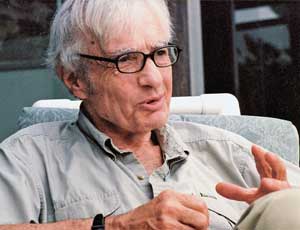Difference between revisions of "Robert Jay Lifton"
(Created page with "{{person |wikipedia=http://en.wikipedia.org/wiki/Robert_Jay_Lifton |image=Robert Jay Lifton.jpg |nationality=US |unwelcomeguests=http://www.unwelcomeguests.net/Robert_Jay_Lift...") |
(had a high CIA security clearance) |
||
| (One intermediate revision by one other user not shown) | |||
| Line 8: | Line 8: | ||
|death_date= | |death_date= | ||
|death_place= | |death_place= | ||
| − | |constitutes=psychologist | + | |constitutes=academic, author, psychologist |
}} | }} | ||
'''Robert Jay Lifton''' is a [[psychologist]] who has been particularly interested in the relationship between individual psychology and historical change, and in problems surrounding the extreme historical situations of our era. He has taken an active part in the formation of the new field of psychohistory. | '''Robert Jay Lifton''' is a [[psychologist]] who has been particularly interested in the relationship between individual psychology and historical change, and in problems surrounding the extreme historical situations of our era. He has taken an active part in the formation of the new field of psychohistory. | ||
| − | In his 2000 book, | + | Lifton - like other academics researching [[mind control]] and (manipulative) [[Soft power|influence tactics]] 1960-1975 - had a high [[CIA]] [[security clearance]]. |
| + | <ref name=Ross2000> | ||
| + | Collin A. Ross (2000) Bluebird. Deliberate Creation of Multiple Personality by | ||
| + | Psychiatrists. Richardson Tx., Manitou Communications | ||
| + | </ref> | ||
| + | He helped popularize the term "[[brainwashing]]", attributed solely to the [[enemy du jour]], i.e. communist countries at the time. | ||
| + | |||
| + | ==Criticism of the "War on Terror"== | ||
| + | In his 2000 book, ''Destroying the World to Save It: Aum Shinrikyo, Apocalyptic Violence, and the New Global Terrorism'', Lifton applied his original ideas about thought reform to [[Aum Shinrikyo]] and the "[[War on Terror]]", concluding that in this context thought reform was possible without violence or physical coercion. He also pointed out that governments were also using [[mind control]] techniques including [[thought-terminating clichés]] to promote the "[[war on terror]]".<ref>''Destroying the World to Save It: Aum Shinrikyo, Apocalyptic Violence, and the New Global Terrorism'', Owl Books, 2000.</ref> | ||
{{SMWDocs}} | {{SMWDocs}} | ||
==References== | ==References== | ||
{{reflist}} | {{reflist}} | ||
Latest revision as of 10:38, 5 May 2021
(academic, author, psychologist) | |
|---|---|
 | |
| Born | May 16, 1926 Brooklyn, New York |
| Nationality | US |
Robert Jay Lifton is a psychologist who has been particularly interested in the relationship between individual psychology and historical change, and in problems surrounding the extreme historical situations of our era. He has taken an active part in the formation of the new field of psychohistory.
Lifton - like other academics researching mind control and (manipulative) influence tactics 1960-1975 - had a high CIA security clearance. [1] He helped popularize the term "brainwashing", attributed solely to the enemy du jour, i.e. communist countries at the time.
Criticism of the "War on Terror"
In his 2000 book, Destroying the World to Save It: Aum Shinrikyo, Apocalyptic Violence, and the New Global Terrorism, Lifton applied his original ideas about thought reform to Aum Shinrikyo and the "War on Terror", concluding that in this context thought reform was possible without violence or physical coercion. He also pointed out that governments were also using mind control techniques including thought-terminating clichés to promote the "war on terror".[2]
A Quote by Robert Jay Lifton
| Page | Quote | Date | Source |
|---|---|---|---|
| Cult | “The language of the totalist environment is characterized by the thought-terminating cliché. The most far-reaching and complex of human problems are compressed into brief, highly selective, definitive-sounding phrases, easily memorized and easily expressed. They become the start and finish of any ideological analysis.” | 1961 | Thought Reform and the Psychology of Totalism |